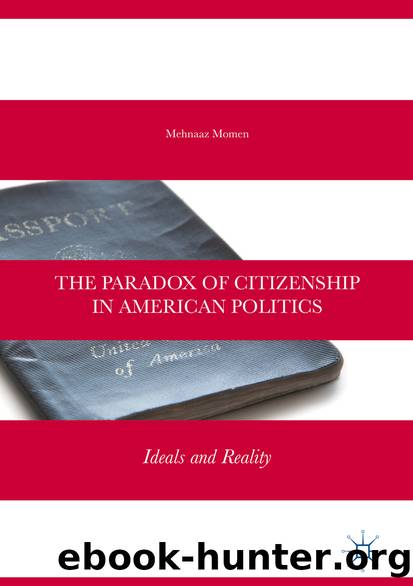The Paradox of Citizenship in American Politics by Mehnaaz Momen

Author:Mehnaaz Momen
Language: eng
Format: epub
Publisher: Springer International Publishing, Cham
The Paradox: The Cosmopolitan Versus the Patriot
Citizenshi p has definitely been impacted by globalization, not only in terms of redefinition of rights and privileges, but also in terms of allowing new entrants into the sweep of American citizenship. Globalization, in a perverse way, has altered the contract between the state and the citizen by allowing new categories of people to join the state without the status of citizenship. Global capitalism , even in its late phase, did not make the state wither away, but certainly changed our sensibility toward citizenship. In an interconnected world of overlapping economies and interpenetrating cultures, the very meaning of national belongingness has acquired a new significance. It redefines the notion of political community, as economic interdependence allows for policy impact across political borders. Cultural ties actually lead to the new identity of cosmopolitan citizenship. Global connections often replace national identity by fusing individuals across all sorts of boundaries.58 In place of national identities and forms of citizenship, postnationalists foresee a rise in transnational identities and citizenship practices that transcend the boundaries of national political communities. Postnationalists locate moral obligation and primary allegiance toward individual human beings in the universal community of humanity.
The new identities that rest on globalization are varied and more suitable to the sensibilities of the twenty-first century where the definition of “us” goes beyond regional commonalities. The challenge comes from the alternate vision of radical democracy or cosmopolitanism,59 which rejects the definition of citizenship as the property of either the state or the nation, and as such offers a postnational concept of citizenship.60 As the nation-state loses much of its previously unchallenged sovereignty, nationalism appears to be on the ascendancy. The new nationalism contains a paradox, whereby the power of the state has weakened yet the influence of nationalism has grown. This new form of nationalism is a product of the internal crisis of the state in the age of globalization as well as a result of the postmodern search for community and identity.
Human rights appear in a new normative framework and a new transnational discourse and structure that not only celebrate, but also actively promote, human rights as a world-level organizing principle. Personal rights, through the universal extension of human rights, can become available to individuals who fall outside the status of national citizenship.61 International civil society is interested in challenging the labor policies of multinational corporations, local customs like female circumcision, state practices like torture, and even the exclusive control of nations over immigration policy. As much as the transnational flow of capital, the new human rights politics are part of what has come to be called “globalization.”62 So far, it is probably the cosmopolitan elite who are able to transfer citizenship privileges to different locales, but for the vast majority of people, especially migrant workers, the ones who are actually stateless, the reality is very different.
The influx of such immigrants in the Western hemisphere is a product of globalization, and has often met with growing anti-immigrant sentiment and a
Download
This site does not store any files on its server. We only index and link to content provided by other sites. Please contact the content providers to delete copyright contents if any and email us, we'll remove relevant links or contents immediately.
| Elections & Political Process | Ideologies & Doctrines |
| International & World Politics | Political Science |
| Public Affairs & Policy | Specific Topics |
| United States |
The Secret History by Donna Tartt(19052)
The Social Justice Warrior Handbook by Lisa De Pasquale(12187)
Thirteen Reasons Why by Jay Asher(8893)
This Is How You Lose Her by Junot Diaz(6877)
Weapons of Math Destruction by Cathy O'Neil(6264)
Zero to One by Peter Thiel(5786)
Beartown by Fredrik Backman(5737)
The Myth of the Strong Leader by Archie Brown(5499)
The Fire Next Time by James Baldwin(5431)
How Democracies Die by Steven Levitsky & Daniel Ziblatt(5215)
Promise Me, Dad by Joe Biden(5141)
Stone's Rules by Roger Stone(5081)
A Higher Loyalty: Truth, Lies, and Leadership by James Comey(4954)
100 Deadly Skills by Clint Emerson(4921)
Rise and Kill First by Ronen Bergman(4779)
Secrecy World by Jake Bernstein(4741)
The David Icke Guide to the Global Conspiracy (and how to end it) by David Icke(4701)
The Farm by Tom Rob Smith(4502)
The Doomsday Machine by Daniel Ellsberg(4484)
